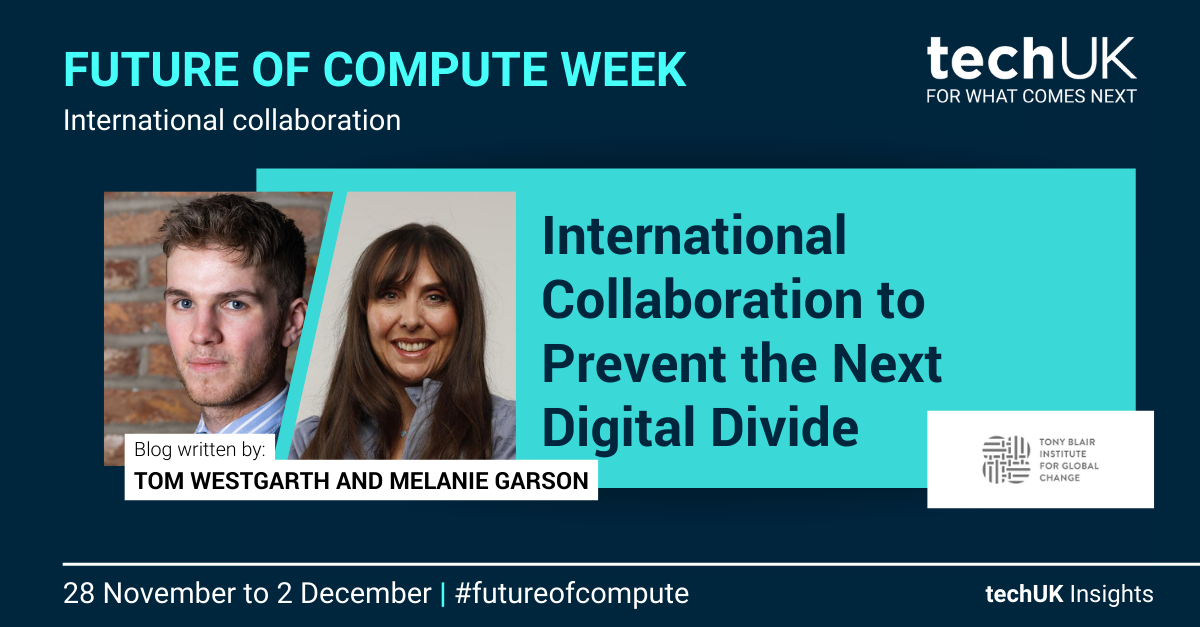International Collaboration to Prevent the Next Digital Divide

We need better data to comprehensively measure the maturity of a nation’s compute ecosystem. But with better measurement comes enormous political challenges, making international collaboration necessary to address the risks of compute divides.
Building any robust infrastructure requires coordination. Be it hospitals, roads, or trainlines: governments have helped play a crucial role in increasing the exchange of knowledge, skills, and capital within a country to build and manage vital projects at scale.
Yet developing modern infrastructure cannot merely be a domestic endeavour. It cannot just be a product of a sovereign mission. The monitoring of epidemics will only succeed with fluid data exchange on new variants and global support to reduce vaccine inequity. Trade mechanisms that account for carbon emissions will only become sustainable when addressing the development challenges of emerging markets. With compute, the rules are similar – coordinating internationally will help to find solutions that organise resources in a more just manner and future-proof against emerging structural and systemic risks.
Enabling international access to supercomputing power will be critical: the Tony Blair Institute for Global Change is creating a National Compute Index to explore the key drivers of infrastructure, skills, and regulation that underpin access to compute power to accelerate and sustain growth and transformation. The indicators will help track and provide a warning bell as to new inequalities that might be emerging in the global tech ecosystem. 60% of the Top 500 supercomputers are currently located in the US and China. Norway has 28x the 5G download speed of Haiti. In the same way that the international policy community has obligations to reduce vaccine inequity, it will also have a duty to help ensure that the future of compute does not become the new digital divide.
Cleavages in compute maturity will also impact our response to the climate crisis. The environmental impacts of operating large-scale computers, from energy and water requirements, are well documented. If compute becomes, as we predict, a critical infrastructure, better information about which countries are using emission-heavy compute architectures will be central to developing plans to transition to more sustainable digital ecosystems.
Tech geopolitics is only likely to increase the complexity. We find ourselves firmly in the age of ‘chiplomacy’ , with further competition for compute resources leading to greater intervention in global markets. New requirements for US firms to have export licenses to sell leading-edge chip hardware and software, as well as the barring of U.S. citizens from working with Chinese chipmakers without approval, mark an escalation in great power rivalry for strategic advantage in compute infrastructure.
Whilst we cannot entirely eliminate the geopolitical dimension that runs throughout the development of critical emerging technologies, we can prevent turning a globally transformative set of resources into a zero-sum game. Measuring the core drivers of compute power can help identify areas for cooperation at the heart of our proposed Digital Infrastructure and Defence Alliance. Through providing trade and security guarantees on the critical elements of elements of critical compute architecture, from semi-conductor supply to internet access, countries can reduce the likelihood of compute power becoming a new source of competition instead of collaboration.
What gets measured is often what gets done. If leaders are to harness the power and potential of technology for the good of people everywhere, having a clear grasp of the realities and possibilities of compute access is instrumental to maximising its opportunity for all. This will generate an imperative to work cooperatively for creative solutions to ensure equality of access and protecting it from geopolitical competition for its control. An imperative that compute is harnessed to provide a beneficial future for all.

Rory Daniels
Rory joined techUK in June 2023 after three years in the Civil Service on its Fast Stream leadership development programme.

Ella Shuter
Ella joined techUK in July 2025 as Junior Programme Manager for Emerging Technologies.

Laura Foster
Laura is techUK’s Associate Director for Technology and Innovation.

Elis Thomas
Elis joined techUK in December 2023 as a Programme Manager for Tech and Innovation, focusing on Semiconductors and Digital ID.


